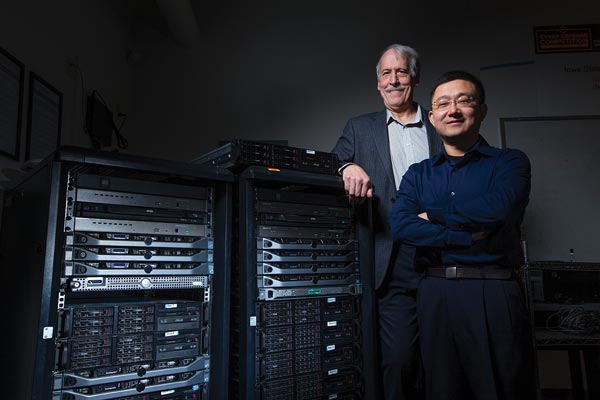
Cyclone Engineers are developing new tools to optimize networking and secure information in our new world of mobile devices in every pocket, “smart homes,” and remote sensors on everything from bridges to plants.
“Cyber is no longer just in our computers. It’s now ‘cyber everywhere,’” said Daji Qiao, associate professor of electrical and computer engineering. “That opens the door for these devices to make our lives easier – but it also presents never-seen-before problems for security.”
Qiao is leading a National Science Foundation project to create a new type of test bed to better understand the behavior of the Internet of Things and advance IoT networking, performance and security.
The research team, which also includes Doug Jacobson, University Professor of electrical and computer engineering and director of Iowa State’s Information Assurance Center; Yong Guan, associate professor of electrical and computer engineering; and George Amariucai, associate professor of computer science at Kansas State University, plans a scalable, hybrid research “sandbox” so researchers can try out new IoT strategies.
First, the team will build a small, lab-based physical IoT network of devices ranging from simple to sophisticated and capture devices’ and network behavior. Next, they will build a larger, more complex IoT network on campus. Last, they’ll work to integrate the physical IoT networks with a virtual network, built on Jacobson’s ISEAGE environment.
ISEAGE is a unique, open-source internet emulator that was created so researchers could run and study controlled cyberattacks without actually causing any cyber damage.
“Just like in experimenting with internet attacks, we simply cannot build a physical replica of the IoT network large enough to give us an accurate picture,” said Jacobson. “ISEAGE offers a platform to add large-scale virtualization – and it’s a great fit for extending to the IoT.”
The hybrid virtualized test bed, called IoT Event Emulation Environment or IoTE3, will be made available to researchers across the nation to run their own experiments. And as more and more new physical IoT devices are added to the system, the size and the realism of IoTE3 will grow and grow.
“The virtualization network will be the bridge between all the physical networks. It will continue to monitor what happens and feed that into its virtual simulator,” said Qiao. “As we see changes in the IoT, we will continually update and upgrade to better reflect real life.”
Information Assurance Center: Research, Teaching, Outreach
Iowa State’s Information Assurance Center is a nationally recognized leader in information assurance research, teaching and outreach.
The IAC is one of the oldest and largest information assurance groups in the country, earning a charter designation as a Center of Excellence by the National Security Agency. Interdisciplinary research efforts range from network modeling to data mining to identity theft.
“More than 40 faculty from diverse areas of expertise come together in the IAC to work on the big challenges to securing computers, network, things and people,” said Doug Jacobson, IAC director and University Professor of electrical and computer engineering. “Our research is world class, but we couple that with education and outreach to increase our impact.”
Since the mid-90s, IAC faculty have trained new generations of information assurance researchers in their laboratories. And more recently, the IAC launched Iowa Cyber Alliance, the nation’s first state-wide program to provide cyber security outreach and education to government agencies, businesses and all Iowa citizens.